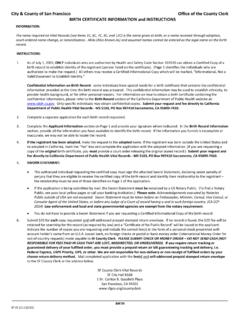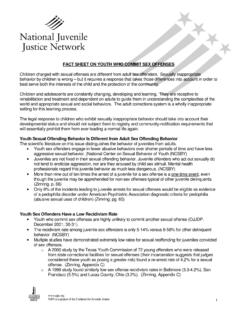Transcription of Police Code, Article 49 - San Francisco
1 Post where readily accessible to job applicants and employees. CITY AND COUNTY OF SAN Francisco EDWIN M. LEE, MAYOR NOTICE TO JOB APPLICANTS AND EMPLOYEES San Francisco Fair chance Ordinance Police Code, Article 49 9/14 OFFICE OF LABOR STANDARDS ENFORCEMENT City Hall, Room 430 1 Dr. Carlton B. Goodlett Place San Francisco CA 94102-4685 Tel. (415) 554-6235 Fax (415) 554-4791 Starting August 13, 2014, the Fair chance Ordinance (San Francisco Police Code, Article 49) requires employers to follow strict rules regarding the use of arrest and conviction records in hiring and employment decisions. The ordinance covers job applicants and employees who would be or are performing work in whole, or in substantial part, in San Francisco and applies to employers who have 20 or more employees (regardless of the employees locations). Certain matters are off-limits.
2 An employer may never ask about, require disclosure of, or consider: an arrest not leading to a conviction (other than an unresolved arrest that is still undergoing criminal investigation or trial); participation in a diversion or deferral of judgment program; a conviction that has been expunged or made inoperative; any determination in the juvenile justice system; a conviction more than 7 years old; and a criminal offense other than a felony/misdemeanor. Matters that are off-limits cannot be used by the employer for any reason at any stage of the hiring process. An employer cannot ask about an individual s conviction history or unresolved arrests at the start of the hiring process. This includes through a job application form, informal conversation, or otherwise. A mandatory interactive process for matters not off-limits. Only after a live interview has been conducted, or a conditional offer of employment made, is the employer allowed to ask about an individual s conviction history (except as to matters that are off-limits) and unresolved arrests.
3 Only those convictions and unresolved arrests that directly relate to the individual s ability to do the job may be considered in making an employment decision. Before the employer may take an adverse action such as failing/refusing to hire, discharging, or not promoting an individual based on a conviction history or unresolved arrest, the employer must give the individual an opportunity to present evidence that the information is inaccurate, the individual has been rehabilitated, or other mitigating factors. The individual has seven days to respond, at which point the employer must delay any adverse action for a reasonable time and reconsider the adverse action. The employer must notify the individual of any final adverse action. Evidence of rehabilitation include satisfying parole/probation; receiving education/training; participating in alcohol/drug treatment programs; letters of recommendation; and age at which the individual was convicted.
4 Mitigating factors include coercion, physical or emotional abuse, and untreated substance abuse/mental illness, that contributed to the conviction. Preemption. Where federal or state law imposes a criminal history requirement that conflicts with a requirement of the Fair chance Ordinance, the federal or state law will apply. No Retaliation. An employer may not take an adverse action against an applicant or employee for exercising their rights under the ordinance or cooperating with the Office of Labor Standards Enforcement OLSE. If you need more information, or wish to report an employer that you believe has violated this ordinance, please contact the OLSE at 415-554-5192 or email













